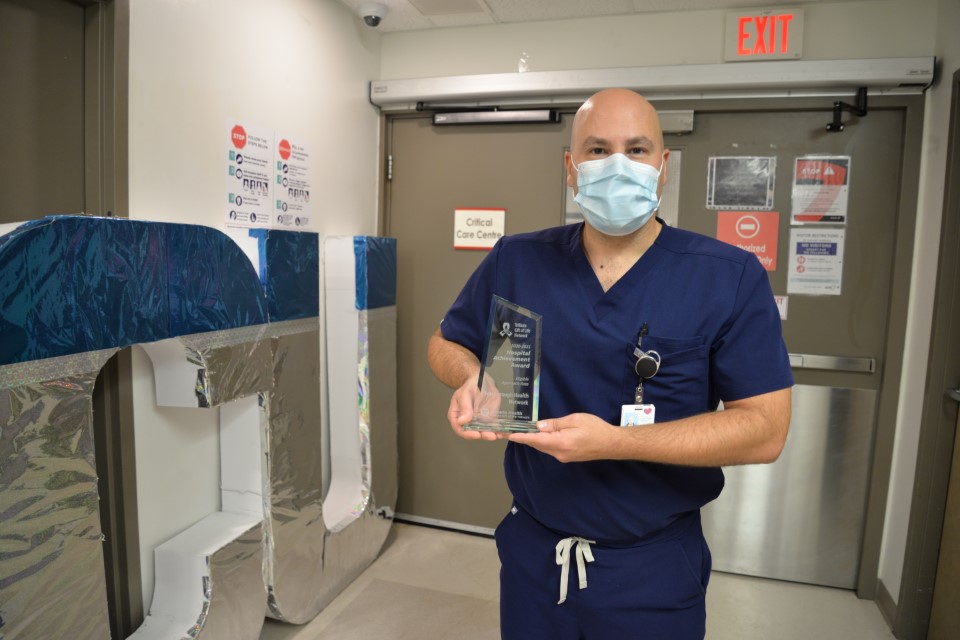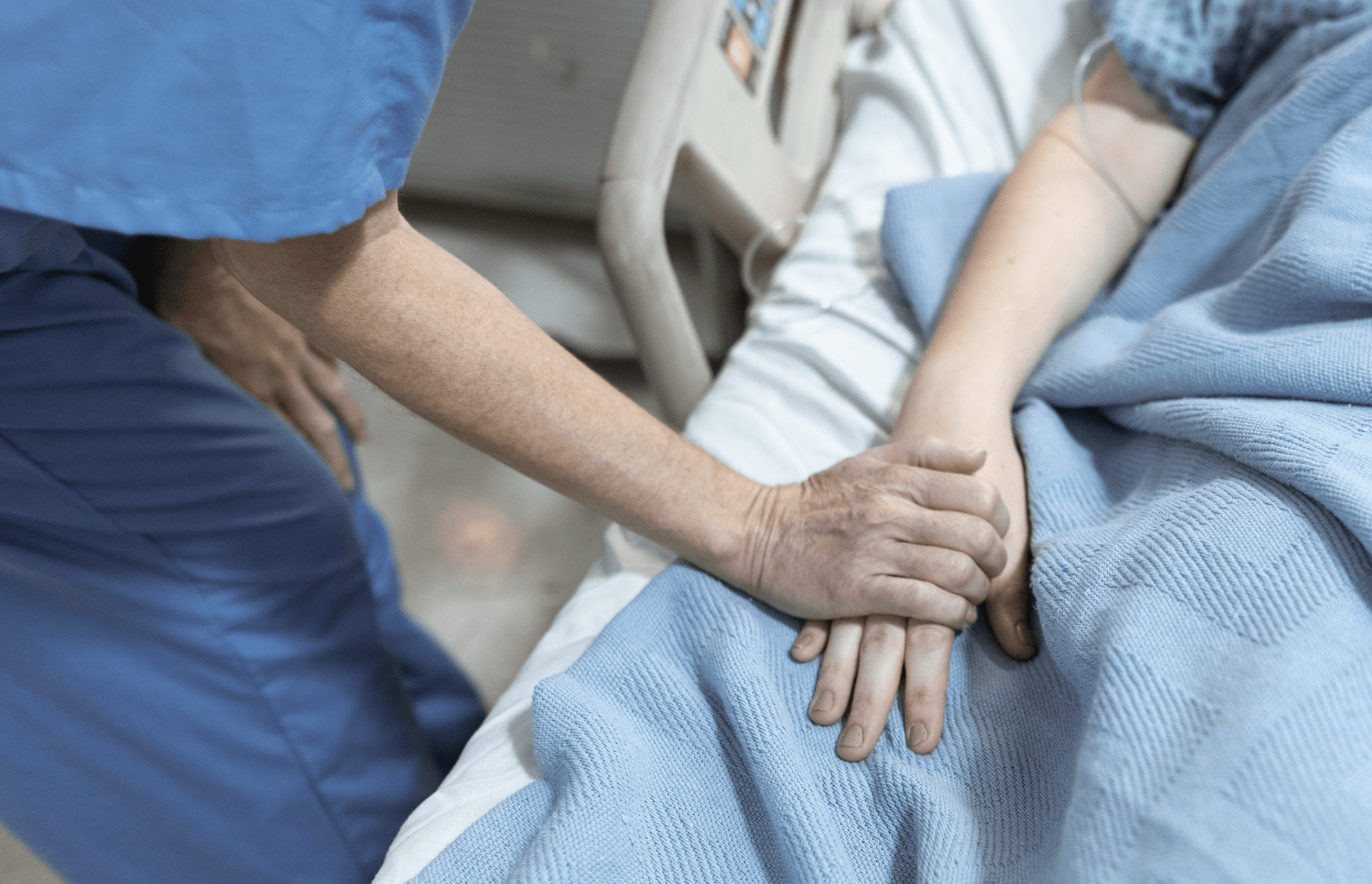Organ donation is an integral part of quality health and end-of-life care, but despite over 90 per cent of Canadians being in support of transplant donation, only about 30 per cent of the population has registered their consent.
Scarborough Health Network (SHN) partners closely with Trillium Gift of Life Network (TGLN) to support organ donation. This effort is led by SHN’s Dr. Chris Lazongas, who is an intensivist on our critical care team and serves as our hospital donation physician.
Last year, SHN received the Eligible Approach Rate Award for compassionately facilitating a donation discussion with 90 per cent of eligible patients/families at the end of life. This year, SHN was awarded the Hospital Performance Award from TGLN for our advocacy and commitment to organ and tissue donation, ensuring patients who are eligible donors and/or recipients are being supported and lives are being saved.
As we acknowledge April as Organ Donation Awareness Month, SHN’s Network News invited Dr. Lazongas to set the record straight on organ donation and debunk some of the myths surrounding it.
Myth: If I agree to donate my organs, saving my life won’t be a priority if I’m sick or injured.
Fact: Healthcare providers are always committed to treating you and delivering the care you need to achieve the best possible outcome for your quality of life. At SHN, our priority is to provide exceptional patient- and family-centered care, and we will involve you in your care as much as possible. The best, most appropriate treatments for you will be provided at every stage of your journey of care.
Organ donation is not considered until after a patient or family has decided to stop life support, or a patient has died. The medical team does not have access to your organ donation registration decision, only the organ donation coordinators do.
It’s also important to note, living donors make thousands of transplants possible every year, and can donate a kidney, a part of the lung or liver, a section of intestine or a part of the pancreas.
Myth: I’m under age 18. I’m too young to make this decision.
Fact: In Ontario, individuals age 16 and over may register for organ donation, but the final decision will be made by your parents or legal guardian. Discuss your registration to become an organ donor with your family so they are aware of your wishes. Children are also in need of organ transplants, and they usually need organs smaller than those an adult can provide.
Myth: An open-casket funeral isn’t an option for people who have donated organs or tissues.
Fact: An open-casket funeral is still possible after organ and tissue donation. The donor’s body is clothed for burial and treated with the utmost care and respect, so there are no visible signs of organ or tissue donation.
Myth: I’m too old to donate, or not in the best of health. Nobody would want my organs or tissues.
Fact: There is no age cut-off for donating organs, and very few medical conditions automatically disqualify you from donating organs. The decision to use your organs is based on strict medical criteria. It may turn out that certain organs are not suitable for transplantation, but other organs and tissues may be fine. Don’t prematurely disqualify yourself. Let the doctors decide at the time of your death whether your organs and tissues are suitable for transplantation.
Myth: Organ donation is against my religion.
Fact: Organ donation is consistent with the beliefs of most major religions, and many encourage it as an act of generosity and compassion. These religions include Roman Catholicism, Islam, most branches of Judaism, and most Protestant faiths. If you’re unsure of or uncomfortable with your faith’s position on organ donation, ask one of your religious leaders, or speak with a member of the hospital’s spiritual care team.
Myth: Maybe I won’t really be dead when they sign my death certificate.
Fact: Determination and declaration of death is a highly structured and regulated procedure. Despite sensationalized articles in the news, in reality people don’t start to wiggle their toes or wake up after they’re declared dead. A primary moral principle relevant to deceased organ and tissue donation is known as the “dead-donor rule,” which requires patients to be declared dead before the removal of life-sustaining organs for transplantation.
Myth: I’d like to donate, for example, a kidney, but I wouldn’t be allowed to do that unless one of my family members is in need.
Fact: Living donation, like kidney donation, can be done to help close or distant family members, or complete strangers. If you decide to become a living donor, you will undergo extensive questioning to ensure that you are aware of the risks and that your decision to donate isn’t based on financial gain. You will also undergo testing to determine if your kidneys are in good shape and whether you can live a healthy life with just one kidney.
It’s worth mentioning, when it comes to kidneys, Scarborough has a diverse population, and we know there is a higher prevalence of people who get kidney failure, especially among subgroups of people who were not born in Canada and people of non-White ethnicities. In 2021, 14 lives were saved from kidney donation in Scarborough, contributing to a total of 25 lives saved from overall organ donation.
About Dr. Chris Lazongas, MD, FRCPC

Dr. Chris Lazongas is a critical care physician at Scarborough Health Network. He obtained his medical degree in 2006 at the University of Toronto (U of T), where he continued with his residency training in internal medicine. He completed further subspecialty training in critical care medicine, and clinical pharmacology and toxicology, also at U of T, and served as the program director for clinical pharmacology and toxicology at U of T until 2022.
Since completing his medical training in 2011, Dr. Lazongas has spent his entire clinical career in Scarborough, where he also practices clinical pharmacology. He has a special interest in organ donation, and has served as the hospital donation physician since 2014. He is also a consultant toxicologist at the Ontario Poison Centre, located in the Hospital for Sick Children.

